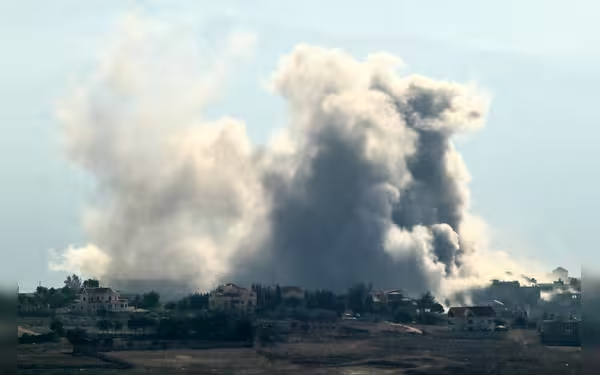Saturday, November 16, 2024 05:39 PM
Israel Warns Southern Lebanon Residents Against Returning Home
- Israeli military warns residents 'not to return to homes'.
- 15 fatalities reported due to recent Israeli airstrikes.
- 1.2 million people displaced since September 2023.
 Image Credits: arabnewspk
Image Credits: arabnewspkIsrael warns southern Lebanon residents against returning home as airstrikes escalate, causing significant casualties and displacement.
In recent weeks, the conflict between Israel and Hezbollah has escalated dramatically, leading to significant humanitarian concerns in the region. The situation has intensified following a series of Israeli airstrikes targeting various locations in Lebanon, which have resulted in numerous casualties and widespread destruction. As tensions rise, the Israeli military has issued warnings to residents in southern Lebanon, advising them "not to return to their homes" amid ongoing hostilities.
On Saturday, Israel ordered further evacuations in southern Lebanon, specifically instructing residents of 23 villages to move north of the Awali River. This directive was communicated through a military statement, highlighting the urgency of the situation. The Israeli military claims that these evacuations are necessary for the safety of civilians, citing increased activities by Hezbollah, which they allege is using civilian areas to hide weapons and launch attacks.
According to the Lebanese health ministry, the recent Israeli strikes have resulted in at least 15 fatalities and 37 injuries across three different areas in Lebanon. Notably, the town of Deir Billa in northern Lebanon was targeted for the first time, raising concerns about the expanding scope of the conflict. The health ministry also reported damage to five hospitals in the eastern city of Baalbek, further complicating the already dire medical situation in the region.
Hezbollah has denied the allegations of concealing weapons among civilians, asserting that their operations are legitimate military actions. The group has also claimed responsibility for drone attacks on the outskirts of Tel Aviv, although Israel reported no casualties from these incidents. The ongoing exchanges of fire and airstrikes have created a volatile environment, with both sides suffering losses.
The United Nations peacekeeping mission in Lebanon, known as UNIFIL, has also been affected by the conflict. A member of UNIFIL was injured by gunfire, and the organization reported significant damage to its position in the southern town of Ramyah due to nearby explosions. The situation has drawn international condemnation, with calls for restraint and a return to dialogue.
As the conflict continues, the humanitarian crisis deepens. The Lebanese government estimates that approximately 1.2 million people have been displaced since September 23, 2023. This figure surpasses the number of displaced individuals during the last major war between Israel and Hezbollah in 2006, highlighting the severity of the current situation. The ongoing violence has not only resulted in loss of life but has also disrupted access to essential services, including medical care.
The conflict between Israel and Hezbollah remains a complex and tragic situation, with far-reaching implications for the people of Lebanon and the broader region. As the international community watches closely, it is crucial to prioritize humanitarian efforts and seek pathways to peace. The hope is that dialogue can replace violence, allowing displaced families to return home and rebuild their lives in safety.













